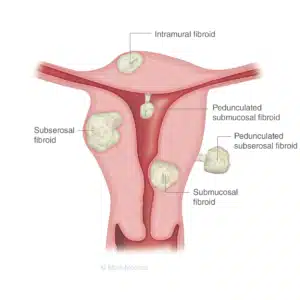Learn more about the many types of fibroids.
THERE ARE FOUR PRIMARY TYPES OF FIBROIDS.
Uterine fibroids may also be referred to as myoma, leiomyoma, leiomyomata, and fibromyoma.
Intramural Fibroids
Intramural fibroid tumors are the most common type of fibroid and typically develop within the uterine wall and expand from there. When an intramural fibroid grows, it tends to make the uterus feel larger than normal, which can sometimes be mistaken for pregnancy or weight gain.
This type of fibroid can also cause excessive menstrual bleeding, prolonged menstrual cycles, clot passing, and pelvic pain due to the additional pressure placed on surrounding organs by fibroid growth.
Subserosal Fibroids
Subserosal fibroids typically develop on the outer uterine wall. This type of fibroid can continue to grow outward, increasing in size. The growth of a subserosal fibroid will put additional pressure on surrounding organs. Therefore, symptoms of subserosal fibroid tumors usually do not include abnormal or excessive menstrual bleeding or interfere with a women’s typical menstrual flow. These fibroids instead cause pelvic pain and pressure. Depending on the severity and the location of fibroids, other complications can accompany this pain and pressure.
Submucosal Fibroids
The least common of the various types of fibroid tumors are submucosal fibroids. These fibroids develop just under the lining of the uterine cavity. Large submucosal fibroids may increase the size of the uterine cavity and can block the fallopian tubes, which can cause complications with fertility. Some submucosal fibroids do not produce any symptoms at all, whereas others can be severely symptomatic.
Submucosal fibroids are associated with bothersome symptoms, such as excessive menstrual bleeding and prolonged menstruation. These symptoms can also cause the passing of clots and frequent soiling, which can take its toll on everyday life. Untreated, excessive or prolonged bleeding can cause more complicated problems, such as anemia and/or fatigue, which could potentially lead to a future need for blood transfusions.
Pedunculated Fibroids
Pedunculated uterine fibroids occur when a fibroid tumor grows on a stalk, resulting in pedunculated submucosal or subserosal fibroids. These fibroids can grow into the uterus and also can grow on the outside of the uterine wall. Symptoms associated with pedunculated fibroid tumors include pain and pressure as the fibroids can sometimes twist on the stalk.
A woman may have one or all of these types of fibroids. It is common for a woman to have multiple fibroid tumors and it may be difficult to understand which fibroid is causing symptoms. Because there can be multiple fibroids located throughout the uterus—some very small in size—there are usually more fibroids present than can be detected. Even a woman who has only one visible fibroid needs to consider that there may be multiple uterine fibroids present when discussing therapy.
A woman may have one or all of these types of fibroids. Some fibroids do not produce any symptoms at all, whereas others can be severely symptomatic. It is common for a woman to have multiple fibroid tumors, and it may be difficult to understand which fibroid is causing specific symptoms. Learn how UFE can alleviate fibroid symptoms.







